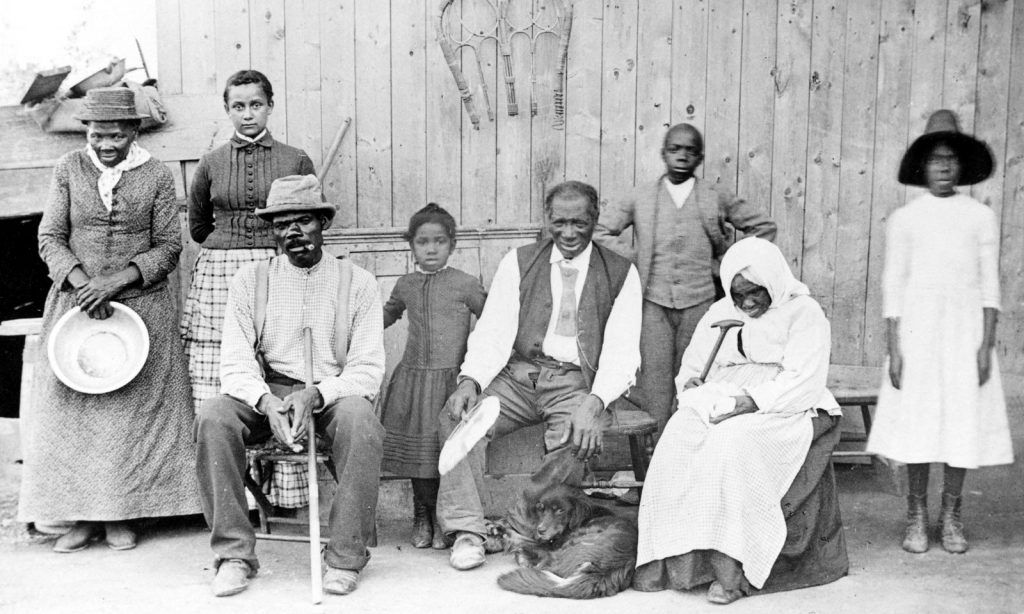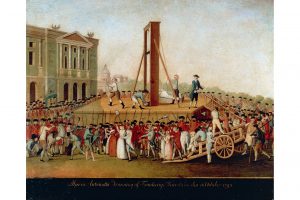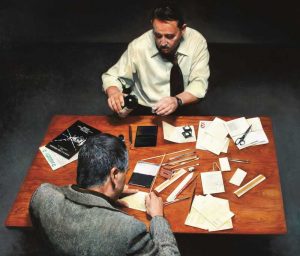It was night, and Harriet Tubman and her brothers began their journey to freedom. But when she looked back, she saw that her brothers were not following behind her. They were frozen in fear, thinking about the fact that they could get caught and face awful consequences. With their fear increasing, they said their goodbyes and headed back to their owners’ house.1 Saddened and alone, Harriet began walking north; nothing was going to stop her from getting what she always wanted, and that was her freedom.
One day, around the age twelve, Harriet Tubman’s owner threw a heavy weight at her after a fit of rage came over him. This fractured her skull, which applied pressure to her brain, and it made her have disabilities while growing up. This wasn’t the only pain Tubman had throughout her childhood. She also saw her sister being sold and taken away from them. Afterward, her parents were saddened and asked themselves why life was the way it was for them.2 Harriet Tubman didn’t know it then, but the struggles she faced when she was a child were only preparing her for the greater things she was going to achieve much later.
By the time Harriet Tubman had grown older and wedded, not many changes had been made in regards to the treatment of African-American slaves. In the 1840s, Tubman, along with her husband, John Tubman, a free man, worked with her brothers as cotton field slaves. During this period, it had become known to her that their master had made plans to sell her and her brothers, leading the family to be separated once again. If the idea of being separated from her family had not been fearful enough for Tubman, the unspoken horrors of being sent further South added to the horror of being torn away from what she already knew.3

Within her, the desire to be free became stronger and stronger. It had grown so much within her that she spoke to her husband John about it, to which he responded that he would tell her master if she ever attempted to run away. John being a free man held a certain power over his wife that she was not capable of fighting. Since her husband had made his opinion known to her what he would do if she were to try and escape, their last known moments together were filled with tension, and Harriet was on edge constantly.4 However, even with the threats coming from John, this did not fully keep Harriet from planning her escape; it had just delayed it. More than ever, she was determined to become free and leave her condition of dependence on not only her master, but also on her husband. She was very careful in discussing her plans to run away and when she would do it.5
On the night of her escape, she gathered her brothers and began singing a song to the other slaves, telling them that they were leaving. She led the way north, but when she turned around, she saw that her brothers were not following. They were afraid that they would get caught and face horrible consequences. They said their goodbyes to their sister and headed back to their master’s house. Even though Harriet was now alone, and much more vulnerable than before, she headed North towards her freedom.6 Tubman would travel during the night, because it made it harder for people to see her, and she would hide out during the day with people she could trust. After long days of traveling, she finally reached a Northern state, where she could be a free woman.
Yet even gaining her freedom, she could not stop thinking about her brothers and how they were still living as slaves. She decided to create a plan to go back and rescue her brothers. She knew that it would be extremely dangerous to return to the southern states because of the Fugitive Slave Act, which stated that it made it illegal for slaves to escape and illegal for anyone to help them. It also made it easier for slave owner to reclaim their slaves after they escaped.7

With the help of the Quakers, she was able to help her brothers and niece to escape.8 She did not want to stop there, so she returned to the South nineteen more times to help rescue more people. They called it the Underground Railroad, which is what Harriet Tubman is famously known for. The courage she showed, to be able to escape and then go back to help others also escape, has been greatly valued ever since. She helped others find the courage within them to fight for the abolition of slavery.
- Sarah Bradford, Harriet Tubman The Moses of Her People (New York: Corinth Books Inc., 1961), 29. ↵
- Sarah Bradford, Harriet Tubman The Moses of Her People (New York: Corinth Books Inc., 1961), 14-15. ↵
- James McGowan, Harriet Tubman: A Biography (Santa Barbara, Calif: Greenwood. 2011), 4-6. ↵
- Rosemary Sadlier, Harriet Tubman Freedom Seeker, Freedom Leader (Dundurn, 2012), 48-49. ↵
- Rosemary Sadlier, Harriet Tubman Freedom Seeker, Freedom Leader (Dundurn, 2012), 48. ↵
- Sarah Bradford, Harriet Tubman The Moses of Her People (New York: Corinth Books Inc., 1961), 29. ↵
- Encyclopedia of African American History, 2010, s.v. “Fugitive Slave Act of 1850,” by Alfred L. Brophy. ↵
- Rosemary Sadlier, Harriet Tubman Freedom Seeker, Freedom Leader (Dundurn, 2012), 50. ↵



84 comments
Edith Santos Sevilla
This story is impressive in how one person created so much change. I like the point of view that was taken on the Underground Railroad and it shows how there was human people sacrificing things in order to achieve freedom. I had hear of the Underground Railroad and Harriet Tubman but I had never hear the story in such detail that it showed how with her brothers they were going to scape. It bothers me that people didn’t supported the slaves and when they ran away there was different laws that didn’t protect them. While reading the article it made me realize how lucky we are for those people that have fought for freedom over the years.
Kasandra Ramirez Ferrer
I think one of the most horrifying things that man has done was the way white people used to treat people of color, sadly some of them have the same absurd idea today. Harriett Tubman was a strong, selfless and woman who fought for what she wanted, that thing was her freedom and she earned it even with having the most difficult obstacles. Even after gaining her freedom she still went back for her family risking everything and then helping people like her because she believes no one should be treated with that kind of aggression and that they deserved better.
Addie Piatz
I always loved the story of The Underground Railroad and how Harriett Tubman was such an exceptional leader. I did not however, know that he was married to a free man. I also did not know that she worked with the help of the Quakers. I loved how she went back for her family but didn’t want to stop there. She wanted to help as many people as she could knowing how dangerous it would be. She was a strong and brave woman and women and girls everywhere should look to her as an example just as I’d like to.
Sydney Hardeman
Harriett Tubman is a very selfless, strong, determined hero. I did not know about some of the details of her life that you discussed like her brothers not following her the first time, her husband threatening her, and her skull being fractured by her slave owner so this was very informative and I am glad to have heard more about her story.
Angelina Gonzalez
Harriet Tubman is a true hero and inspiration to all. She is a prime example of what being courageous means. It takes a determined person to rebel and risk their life basically to fight for what they believe is right. Not only was she brave and successful, but the fact that she went back nineteen times is completely insane and extremely dangerous. She deserves the recognition she gets to this day because of the difference she made in peoples lives.
Roberto Rodriguez
I think (like many other people) Harriet Tubman does not get enough credit in history textbooks. I first learned about her in third grade in history class and all I really learned was she was the “founder” of the Underground Railroad. I mean sure you can argue she is not as important in the grand scheme of things as people like Abraham Lincoln or Ulysses S. Grant, but I feel like she sure deserves a lot more than what she currently has. I feel like I was sold short when I first learned about her, her background is definitely worth going more in depth into then just the Underground Railroad (as proven by this article). I am glad that somebody took the time to give her an article that shows her inspirational background.
Paul Garza
I’m sure a lot of people have heard of Harriet Tubman or her story however, this is a great reminder of the person that she was. From Harriet Tubman, people can see a real life definition of what bravery, courage and selflessness. Relating to more recent news, I hope one day they do decide to put Harriet Tubman on the $20 bill instead of Andrew Jackson. I appreciate this article because it is a great way to allow others to be reminded of this incredible woman.
Diego Terrazas
Harriet Tubman was indeed an exemplar of a selfless person who deemed it her duty to assist others. I have a tremendous amount of respect for such selfless people because quite frankly many would have not thought to go back to the South through the underground railroads after just reaching freedom. I aspire to be as selfless as her and many others in my life.
Maria Garcia
I remember back in elementary school we were showed a cartoon movie about Harriet Tubman and the underground railroad. I was so into it because she really gave up so much to help others and get the freedom she so badly wanted. She was such a selfless person, and this article does nothing but defend that. This article was very well written, and described things straight to the point. I loved it.
Diamond Davidson
It was a good article to read. This article was short, but straight to the point. One thing I believe could’ve been better was when you repeated the same line about her brothers freezing up to go with her, I think you could’ve worded it differently to where it didn’t sound the same as your introduction. Overall, it was really good.